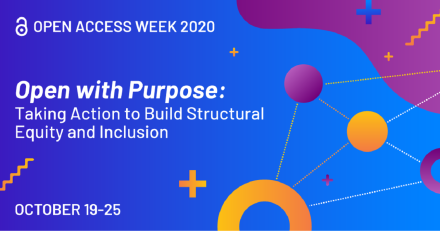
No in-person events at your Library this term? No problem!
This year’s Open Access Week theme is “Open with Purpose: Taking Action to Build Structural Equity and Inclusion.” In a post announcing the theme, SPARC’s Nick Shockey emphasized that “organizers are encouraged to host discussions and take action around this year’s theme whenever is most suitable during the year and to adapt the theme and activities to their local context.”
To that end, purposeful open access advocacy can take many forms at many points throughout the year. Below are some alternatives to doing typical in-person Open Access Week workshops and speaker events.
Staff Training
The pace at which scholarly communications is evolving can be a lot for people to keep up with. Bring librarians and library staff that you work alongside together to discuss the current state of open access and the challenges and opportunities that these developments present.
Need inspiration for staff training? Here are some ideas:
- Situating open access-related training into relatable scenarios can help increase understanding and buy in among your colleagues. Here’s an example from our regional training day in 2018 that can be used for inspiration.
- Provide an OA “Year in Review” presentation to go over new developments, terminology, and updates at your own institution.
- SCUBA – Scholarly Communication UnBoxed Activities: This site presents a blueprint for hosting activities where library workers can collaborate to build a shared understanding of scholarly communications practices at their institutions.
Meet Them Where They Are
Connect with campus stakeholders at meetings that are already happening throughout the year to discuss open access options and services that can advance research dissemination. Faculty, graduate students, and those working in research offices and research institutes, for instance, don’t always show up to workshops and similar events led by the Library even in normal times. Still, they do have an interest in these topics. Going to them can create opportunities for additional engagement, consultation and collaboration. Consider asking to present to regular meetings at offices such as Research Services, Graduate Studies, or public relations, or units focused on community or knowledge engagement to demonstrate how library services can contribute to more openly available research.
Web based or social media campaigns may also be effective this year, such as this interactive online quiz from UC Boulder Libraries. Or consider making theses and dissertations from notable alumni available on your institutional repository (remember when Stephen Hawking’s thesis went viral in 2017?).
Consider the Return on Investment
Many of us working in scholarly communications have spent time and energy organizing and promoting poorly attended events. Not doing anything for Open Access Week is an OK option too. Sometimes time is better spent elsewhere, like developing an open access policy, exploring ways to redistribute collection dollars to support open, launching a student journal, or developing services to support faculty in their evaluations of suitable publishers for their research. And don’t forget to take time for your own professional development by attending a conference or community call.
- Check out the COPPUL Scholarly Communications Working Group’s issue briefs to learn more about these and other options for supporting open access throughout the year.
Recommended read:
Champieux, R., Thomas, C. & Versluis, A. (2020). Using outreach weeks to examine labor, assessment and value in open advocacy. Journal of Librarianship and Scholarly Communication, 8(1), p.eP2371. http://doi.org/10.7710/2162-3309.2371
This post co-written by Robyn Hall and Christie Hurrell
